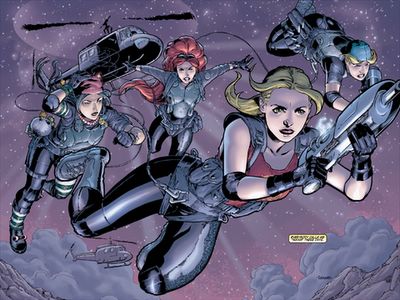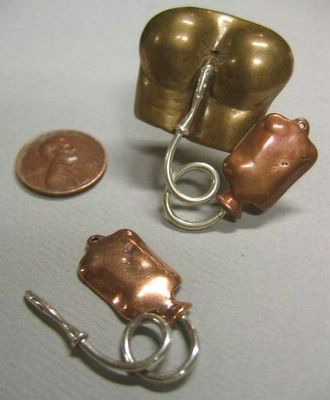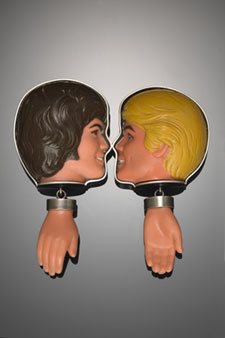Eau de Humanity!
Sunday, December 31, 2006
Thursday, December 28, 2006
Yow! I Do Loves Me Some YouTube!
I just came upon two Big Mama Thornton videos from 1965!
Good stuff, folks! Blues at its best.
"Down Home Shakedown" with her, Big Walter Horton, Carey Bell, John Lee Hooker and J.B. Lenoir all playing harmonica:
and "Hound Dog" with Buddy Guy on guitar!
The Return of Buffy!!

Just read over on Sparky's blog that Joss Whedon willl be doing a season eight of Buffy starting up a few months after season seven left off. You can read the interview with him here.
The comic, due out starting in March, is by Dark Horse Comics where you can preorder it. I hope it turns out well.
Wednesday, December 27, 2006
Another Quiz
Still a bit sick (chest cold since Sunday) so I'm taking it easy.
Got this via Aaron who got it via Secret Simon

Tuesday, December 26, 2006
Gerald Ford - R.I.P.

Former president Gerald Ford dies at 93
WASHINGTON — Gerald Rudolph Ford, an Eagle Scout from Grand Rapids, Mich., whose earnest integrity helped Americans recuperate from the devious evils of the Watergate affair, has died at age 93.
Ford was the nation's only unelected president, radiant with decency, successful without seeming ambitious, "an ordinary man," according to biographer James Cannon, called to serve America in extraordinary circumstances.
Nobody's fool - Ford graduated in the top third of his Yale Law School class - he profited all his life from people who underestimated him. But Ford was a wooden speaker, more consensus-builder than leader, and, in what was then the closest presidential election in 60 years, he lost in 1976 to Jimmy Carter.
It was the only election America's 38th president ever lost. But it was also his only campaign outside Michigan's Fifth District, the optimistic, entrepreneurial, moderate Republican stronghold that Ford represented in Congress - embodied, you could say - for nearly 25 postwar years.
Ford, then House minority leader, intended to retire in 1976 and had promised his wife, Betty, that he would. But Richard Nixon picked Ford in October 1973 as his second vice president. Nixon's first, Spiro Agnew, had been forced to resign in a plea bargain after Justice Department investigators determined that Agnew had taken kickbacks from Maryland contractors.
"Well, it would be a good way to end my career," Ford responded with characteristic, slightly ungainly modesty. He was the choice, Nixon had determined, of most Democratic and Republican congressional leaders. Ford succeeded Nixon on Aug. 9, 1974, after irrefutable taped evidence showed that Nixon had, despite his denials, participated in the cover-up of a break-in at Democratic Party headquarters.
"My fellow Americans, our long national nightmare is over," said Ford as he took office. Ford had argued with his speechwriter that "long national nightmare" was too hard on Nixon, but it was just the right chord to strike, as were Ford's first White House days. After two weeks on the job, Ford's Gallup Poll approval rating had soared to 71 percent.
Then, a month later, from an absolute conviction that it was, Ford said, "the right thing to do," he forfeited much of his popularity and his political future in a single stroke: He pardoned Nixon unconditionally. While Ford denied that the pardon had been part of the bargain with Nixon to induce him to step down, that suspicion was widespread and persistent.
"This blundering intervention is a body blow to the President's own credibility and to the public's reviving confidence in the integrity of its government," sputtered a New York Times editorial. Overnight, Ford's popularity plummeted 22 points.
The political price was certifiably permanent. Ford lost the popular vote to Carter by 47.9 percent to 49.9 percent in 1976. Roughly six percent of voters interviewed in exit polls said Ford's pardoning of Nixon had made it impossible for them to vote for him.
Was there a deal? Ford's standing in history depends largely on the answer. Certainly, Nixon's chief of staff, Alexander Haig, had approached Ford while Ford was vice president to sound him out on a pardon for Nixon. And certainly, Haig, who served as Ford's chief of staff, kept Nixon abreast of Ford's thinking about a possible pardon after Nixon resigned.
Ford was "not instinctively suspicious" by nature, however, and may not, according to longtime senior adviser Robert Hartmann, have considered his pardon discussions with Haig to have been soundings-out for Nixon's benefit. Haig, at any rate, kept his conferring with Nixon about a pardon secret from Ford.
Rep. Peter Rodino, D-N.J., who'd been chairman of the House Judiciary Committee investigating the Watergate affair, tried to clarify the ambiguous situation in an interview 17 years later with Ford biographer Cannon. "Nixon, being the kind of manipulator he was, knew that Ford was a feeling, humane and decent guy," Rodino told Cannon, "and might have felt that a pardon was something he could count on from Ford. But Jerry Ford is not the man who would ever make a deal like that. Jerry was like a Boy Scout - the truth is the truth.
"Any number of people felt there had to be a deal," Rodino said, "but they didn't know Jerry Ford."
Rodino accepted Ford's explanation that only a pardon could avert years of sordid, distracting humiliation that trials of Nixon and his henchmen would have produced.
None of the other ups and downs of Ford's 895-day presidency - the final helicopter withdrawal of U.S. Marines from Saigon, the big red-and-white Whip Inflation Now lapel buttons, the beginnings in Helsinki, Finland, of successful arms reduction measures - defined the man as clearly as Ford's pardon of Nixon did.
Over a lifetime, Grand Rapids had created him. Born Leslie Lynch King, Jr. in Omaha, Neb., he adopted his stepfather's name after his parents divorced and his mother moved to Grand Rapids and married Gerald R. Ford Sr.
The stepson was a handsome and popular teen in the city of 169,000, a Boy Scout in fact and values. His mother, a good Episcopalian, was a member of the Daughters of the American Revolution. The Depression had squeezed his stepfather, a varnish salesman to local furniture makers, however, to the point that college looked impossible for Ford. Thanks largely to a scholarship fund created from bookstore profits at Grand Rapids South High School, where he'd been an all-state center on the football team, Ford graduated from the University of Michigan in 1935.
Although "Saturday Night Live" caricatured Ford as a klutz, and TV news clips showed him hitting his head on two aircraft doorjambs, Ford was, among presidents, the most accomplished athlete. The Green Bay Packers and Detroit Lions offered Ford post-college professional football contracts, Detroit's the better offer at $200 a game. Instead, he coached football and boxing at Yale for two years, and, on the second try, won admission to its law school.
The day after Japan's attack on Pearl Harbor, Ford shuttered his thriving Grand Rapids law practice and volunteered for the Navy. He served as a gunnery officer and later a navigation officer on a carrier that won eleven battle stars in 13 months in the Pacific. A year after the war, at age 35, he defeated Grand Rapids' five-term House Republican incumbent. Two weeks after the primary, he married Betty Bloomer Warren, a divorced former John Robert Powers model. She'd been a Martha Graham dancer in New York, then fashion coordinator for Herpolsheimer's, a Grand Rapids department store.
Rep. Ford and Hubert Humphrey, Minnesota's new senator, both got their start in the 81st Congress, sworn in January 1949. One class ahead of them were Reps. Richard Nixon of California and John Kennedy of Massachusetts. Ford's big break was to be named, while a freshman, to the Appropriations Committee's subcommittee on the Army. It was a powerful post that Ford, a hawk when it came to Vietnam and the Cold War, worked extraordinary hours to master.
Coupled with frequent trips to Grand Rapids, however, it meant Ford was rarely home in Alexandria, Va., with the family's two - and eventually four - children. To cope, Betty Ford admitted in her autobiography, "The Times of My Life," she'd sometimes put a spoonful of vodka into her morning coffee. Alcohol, coupled with painkillers taken for a persistent back ailment, led her to admit in 1978, with candor unique among First Ladies, to a substance abuse problem. Betty Ford recovered within the year.
The Fords retired to Rancho Mirage, Calif., and a home alongside the 13th hole at the Thunderbird Golf Club. A $1 million deal as an NBC commentator, a $1.5 million deal for his-her memoirs, and numerous corporate consultancies and board memberships made the Fords multimillionaires in their retirement. Betty Ford co-founded the non-profit Betty Ford Center for substance abusers in 1982.
Presidents Ford and Carter joined to oppose the Reagan administration's arms build-up and President George H.W. Bush's vow to impose no new taxes. Budget-balancing, they argued, was more important. In later years, Ford often appeared at charitable events, particularly those requiring a bag of golf clubs. He swam twice daily well into his 80s.
Four children survive the former president: Michael, director of student development at Wake Forest University in Winston-Salem, N.C.; Steven, an actor in Los Angeles; Jack, a businessman in San Diego, and Susan Ford Bales, an author and activist in drug- and cancer- awareness programs who lives in Corrales, N.M.
The family appeared close and warm for all its travails, largely thanks to Betty. She'd let it all hang out back in 1947 when the couple's courting was still dilatory. As her beau took off without her for a week's skiing in Utah, Betty gave him a lighter for his pipe. She'd had it engraved: "To the light of my life."
Monday, December 25, 2006
James Brown - R.I.P.

TEXTLegendary Singer James Brown Dies at 73
AP) James Brown, the dynamic, pompadoured "Godfather of Soul," whose rasping vocals and revolutionary rhythms made him a founder of rap, funk and disco as well, died early Monday, his agent said. He was 73.
Brown was hospitalized with pneumonia at Emory Crawford Long Hospital on Sunday and died around 1:45 a.m. Monday, said his agent, Frank Copsidas of Intrigue Music. Longtime friend Charles Bobbit was by his side, he said.
Copsidas said the cause of death was uncertain. "We really don't know at this point what he died of," he said.
Pete Allman, a radio personality in Las Vegas who had been friends with Brown for 15 years, credited Brown with jump-starting his career and motivating him personally and professionally.
"He was a very positive person. There was no question he was the hardest working man in show business," Allman said. "I remember Mr. Brown as someone who always motivated me, got me reading the Bible."
Along with Elvis Presley, Bob Dylan and a handful of others, Brown was one of the major musical influences of the past 50 years. At least one generation idolized him, and sometimes openly copied him. His rapid-footed dancing inspired Mick Jagger and Michael Jackson among others. Songs such as David Bowie's "Fame," Prince's "Kiss," George Clinton's "Atomic Dog" and Sly and the Family Stone's "Sing a Simple Song" were clearly based on Brown's rhythms and vocal style.
If Brown's claim to the invention of soul can be challenged by fans of Ray Charles and Sam Cooke, then his rights to the genres of rap, disco and funk are beyond question. He was to rhythm and dance music what Dylan was to lyrics: the unchallenged popular innovator.
"James presented obviously the best grooves," rapper Chuck D of Public Enemy once told The Associated Press. "To this day, there has been no one near as funky. No one's coming even close."
His hit singles include such classics as "Out of Sight," "(Get Up I Feel Like Being a) Sex Machine," "I Got You (I Feel Good)" and "Say It Loud _ I'm Black and I'm Proud," a landmark 1968 statement of racial pride.
"I clearly remember we were calling ourselves colored, and after the song, we were calling ourselves black," Brown said in a 2003 Associated Press interview. "The song showed even people to that day that lyrics and music and a song can change society."
He won a Grammy award for lifetime achievement in 1992, as well as Grammys in 1965 for "Papa's Got a Brand New Bag" (best R&B recording) and for "Living In America" in 1987 (best R&B vocal performance, male.) He was one of the initial artists inducted into the Rock and Roll Hall of Fame in 1986, along with Presley, Chuck Berry and other founding fathers.
He triumphed despite an often unhappy personal life. Brown, who lived in Beech Island near the Georgia line, spent more than two years in a South Carolina prison for aggravated assault and failing to stop for a police officer. After his release on in 1991, Brown said he wanted to "try to straighten out" rock music.
From the 1950s, when Brown had his first R&B hit, "Please, Please, Please" in 1956, through the mid-1970s, Brown went on a frenzy of cross-country tours, concerts and new songs. He earned the nickname "The Hardest Working Man in Show Business."
With his tight pants, shimmering feet, eye makeup and outrageous hair, Brown set the stage for younger stars such as Michael Jackson and Prince.
In 1986, he was inducted in the Rock and Roll Hall of Fame. And rap stars of recent years overwhelmingly have borrowed his lyrics with a digital technique called sampling.
Brown's work has been replayed by the Fat Boys, Ice-T, Public Enemy and a host of other rappers. "The music out there is only as good as my last record," Brown joked in a 1989 interview with Rolling Stone magazine.
"Disco is James Brown, hip-hop is James Brown, rap is James Brown; you know what I'm saying? You hear all the rappers, 90 percent of their music is me," he told the AP in 2003.
Born in poverty in Barnwell, S.C., in 1933, he was abandoned as a 4-year-old to the care of relatives and friends and grew up on the streets of Augusta, Ga., in an "ill-repute area," as he once called it. There he learned to wheel and deal.
"I wanted to be somebody," Brown said.
By the eighth grade in 1949, Brown had served 3 1/2 years in Alto Reform School near Toccoa, Ga., for breaking into cars.
While there, he met Bobby Byrd, whose family took Brown into their home. Byrd also took Brown into his group, the Gospel Starlighters. Soon they changed their name to the Famous Flames and their style to hard R&B.
In January 1956, King Records of Cincinnati signed the group, and four months later "Please, Please, Please" was in the R&B Top Ten.
While most of Brown's life was glitz and glitter, he was plagued with charges of abusing drugs and alcohol and of hitting his third wife, Adrienne.
In September 1988, Brown, high on PCP and carrying a shotgun, entered an insurance seminar next to his Augusta office. Police said he asked seminar participants if they were using his private restroom.
Police chased Brown for a half-hour from Augusta into South Carolina and back to Georgia. The chase ended when police shot out the tires of his truck.
Brown received a six-year prison sentence. He spent 15 months in a South Carolina prison and 10 months in a work release program before being paroled in February 1991. In 2003, the South Carolina parole board granted him a pardon for his crimes in that state.
Soon after his release, Brown was on stage again with an audience that included millions of cable television viewers nationwide who watched the three-hour, pay-per-view concert at Wiltern Theatre in Los Angeles.
Adrienne Brown died in 1996 in Los Angeles at age 47. She took PCP and several prescription drugs while she had a bad heart and was weak from cosmetic surgery two days earlier, the coroner said.
More recently, he married his fourth wife, Tomi Raye Hynie, one of his backup singers. The couple had a son, James Jr.
Two years later, Brown spent a week in a private Columbia hospital, recovering from what his agent said was dependency on painkillers. Brown's attorney, Albert "Buddy" Dallas, said singer was exhausted from six years of road shows.
MMVI The Associated Press. All Rights Reserved. This material may not be published, broadcast, rewritten, or redistributed.
Saturday, December 23, 2006
Cat News with Smiley Muffin
Too friggin' funny. Thanx to Chrisafer for bringing it to my attention.
Episode One:
Episode Two:
Episode Three:
Season's Greetings!
For those who celebrate it - Merry Christmas!!!
CHRISTMAS CAROLS FOR THE DISTURBED
* 1. Schizophrenia --- Do You Hear What I Hear?
* 2. Multiple Personality Disorder --- We Three Kings Disoriented Are
* 3. Dementia --- I Think I'll be Home for Christmas
* 4. Narcissistic --- Hark the Herald Angels Sing About Me
* 5. Manic --- Deck the Halls and Walls and House and Lawn and Streets
and Stores and Office and Town and Cars and Buses and Trucks and Trees
and.
* 6. Paranoid --- Santa Claus is Coming to Town to Get Me
* 7. Borderline Personality Disorder --- Thoughts of Roasting on an Open Fire
* 8. Personality Disorder --- You Better Watch Out, I'm Gonna Cry, I'm
Gonna Pout, Maybe I'll Tell You Why
* 9. Attention Deficit Disorder --- Silent night, Holy oooh look at
the Froggy - can I have a chocolate, why is France so far away?
* 10. Obsessive Compulsive Disorder --- Jingle Bells, Jingle Bells,
Jingle Bells, Jingle Bells, Jingle Bells, Jingle Bells, Jingle Bells,
Jingle Bells, Jingle Bells, Jingle Bells, Jingle Bells, Jingle Bells,
Jingle Bells, Jingle,Bells, Jingle Bells, Jingle Bells, Jingle Bells,
Jingle Bells, Jingle Bells, Jingle Bells, Jingle Bells, Jingle Bells,
Jingle Bells, Jingle Bells, Jingle Bells, Jingle Bells, Jingle Bells,
Jingle Bells, Jingle Bells, Jingle Bells, Jingle Bells, Jingle Bells,
Jingle Bells, Jingle Bells, Jingle Bells, Jingle Bells, Jingle Bells,
Tuesday, December 19, 2006
Dudley Do-Right Has Mounted His Last
(P.S. Dave - I'll do the meme soon! Really! --Lee)
'Rocky and Bullwinkle' Writer Dies at 81
Dec 18, 11:39 AM EST
The Associated Press
BEVERLY HILLS, Calif. -- Chris Hayward, an Emmy-winning television writer who helped develop the bumbling animated Canadian Mountie Dudley Do-Right and other offbeat characters for the Rocky and Bullwinkle TV show, has died. He was 81.
Hayward died of cancer Nov. 20 at this Beverly Hills home, his wife, Linda, told the Los Angeles Times in Sunday editions.
Hayward contributed satire, wordplay and puns for "Rocky and His Friends," a witty cartoon that built a large adult following. The show debuted on ABC in 1959 and was renamed "The Bullwinkle Show" when it moved to NBC in 1961.
Besides its titular flying squirrel and moose, the hit show featured segments including Mr. Peabody, a time-traveling dog with a boy companion, and Dudley, a klutzy hero always in pursuit of his nemesis Snidely Whiplash.
The first episode Hayward co-wrote for the two lead characters was "Rue Britannia," according to "The Moose That Roared" (2000), a history of the show. In the episode, Bullwinkle has to stay in the Abominable Manor in England.
"Shucks, I've been livin' in an abominable manner all my life!" the moose says.
Jay Ward, whose studio produced the show, gave very little instruction to Hayward when it came to reinventing the Do-Right character, which had been around since the late 1940s.
"It's about a stupid Mountie. Just have fun!" Hayward recalled.
The character was voiced by Bill Scott, who also was the voice behind Bullwinkle.
With partner Allan Burns, Hayward later helped create "The Munsters," and in 1968 the pair received an Emmy for their work on the CBS sitcom "He & She."
Born in Bayonne, New Jersey, Hayward moved to Los Angeles at age 17. He took a night class in scriptwriting at a local high school and went into television in the 1950s. He worked on "Crusader Rabbit," the first cartoon show created specifically for television, as well as "Get Smart," "My Mother the Car" and "Barney Miller."
In addition to his wife, Hayward is survived by his children, Laurel, Victoria and Tony, from a previous marriage that ended in divorce.
Wednesday, December 13, 2006
Crumb-cast Strikes Again
Friggin' system-wide crash for both cable modem and tv for 6.5 hours last night! I had to actually DO something constuctive instead of futaing around on line! I'm just glad I didn't need to do any school work online.
Sunday, December 10, 2006
Friday, December 08, 2006
The Jewelry Dept. of the "Oh. My. Gawd!" Store
I found these very interesting, to say the least, pieces of Jewelry via Davezilla's and AmericanInventorSpot's Michelle's sites and, giving my bizarre and twisted sense of appreciation, I liked this. The jeweler, Luna Parc owner Ricky Boscarino, does have some other non-anatomy pieces which are nice

These ones...:



...are from jeweler Margaux Lange's plastic body parts series of brooches, bracelets, necklaces, earrings, and rings.
Scary Mary
Sorry I haven't been 'round the past week posting here but the semester's winding to a close and I had a shitload of readin' and writin' and quiz takin' to do before it ends. Just a final on Monday and then I'll be on vacation! YIPPIE SKIPPY! {insert imaginary video of me doing happy dance here)
Anyway, in the meantime, I present this - The Scary "Mary Poppins" Video! Hilarious!!
######
BTW - Check out Baby Jane as an Elf!
Friday, December 01, 2006
World AIDS Day

Take Action Today
In Memorial
Emilio Escarcega
Monte-Jon Gilmer
Damon Anthony
Gary Feltner
Steve Hall
Delbert Hibden
Gene Kelton
Glenn Sabel
Newton-John Skinner
Gary Trent
Louie Wash
And in honor of those living with with the disease.



